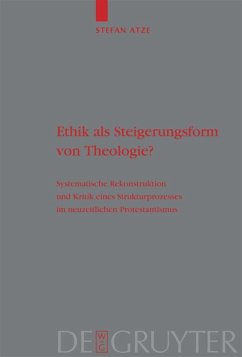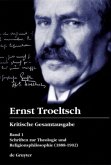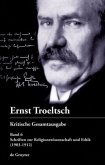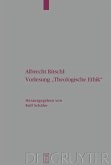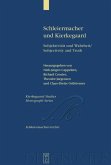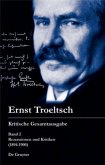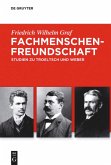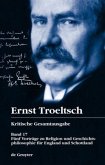This study examines the systematic adoption of modern thought by Protestant theology. It discusses theological models which not only topicalise new age themes on a theological level, but translate them directly into a draft programme. The external characteristic of these positions is the central importance of ethics, which functions as a foundation for theology. It is man, not God, from whom theological thinking emanates. The history of radical models of this kind is traced and they are subjected to critical examination.
In dieser Studie wird die konsequente Übertragung neuzeitlichen Denkens auf die protestantische Theologie untersucht. Es kommen theologische Entwürfe zur Sprache, die die Neuzeitthematik nicht nur auf theologischer Ebene reflektieren, sondern unmittelbar in einen Programmentwurf übersetzen. Das äußere Kennzeichen dieser
Positionen ist die zentrale Bedeutung der Ethik, die für die Theologie eine begründende Funktion übernimmt.
Der gezielte Entwurf einer Theologie aus den Grundprämissen der Neuzeit heraus ist Ausdruck eines in prinzipieller Hinsicht aufgeklärten Bewusstseins und Gestaltungswillens. Theologiegeschichtlich lässt sich hier eine Entwicklungslinie ausmachen, in der prinzipientheologisch die Selbstexplikation Gottes durch die Selbstthematisierung des Menschen abgelöst wird. Ausgehend vom Strukturbegriff eines "konsequent aufgeklärten Protestantismus" wird die Entwicklung einer derartigen ethischen Begründung von Theologie rekonstruiert und einer systematischen Kritik unterzogen. Hierbei wird die Linie von der Reformation und der Aufklärung bis zur Gegenwart verfolgt und anhand der christentumstheoretischen Gesamtentwürfe von Ernst Troeltsch und Trutz Rendtorff problematisiert.
In dieser Studie wird die konsequente Übertragung neuzeitlichen Denkens auf die protestantische Theologie untersucht. Es kommen theologische Entwürfe zur Sprache, die die Neuzeitthematik nicht nur auf theologischer Ebene reflektieren, sondern unmittelbar in einen Programmentwurf übersetzen. Das äußere Kennzeichen dieser
Positionen ist die zentrale Bedeutung der Ethik, die für die Theologie eine begründende Funktion übernimmt.
Der gezielte Entwurf einer Theologie aus den Grundprämissen der Neuzeit heraus ist Ausdruck eines in prinzipieller Hinsicht aufgeklärten Bewusstseins und Gestaltungswillens. Theologiegeschichtlich lässt sich hier eine Entwicklungslinie ausmachen, in der prinzipientheologisch die Selbstexplikation Gottes durch die Selbstthematisierung des Menschen abgelöst wird. Ausgehend vom Strukturbegriff eines "konsequent aufgeklärten Protestantismus" wird die Entwicklung einer derartigen ethischen Begründung von Theologie rekonstruiert und einer systematischen Kritik unterzogen. Hierbei wird die Linie von der Reformation und der Aufklärung bis zur Gegenwart verfolgt und anhand der christentumstheoretischen Gesamtentwürfe von Ernst Troeltsch und Trutz Rendtorff problematisiert.

